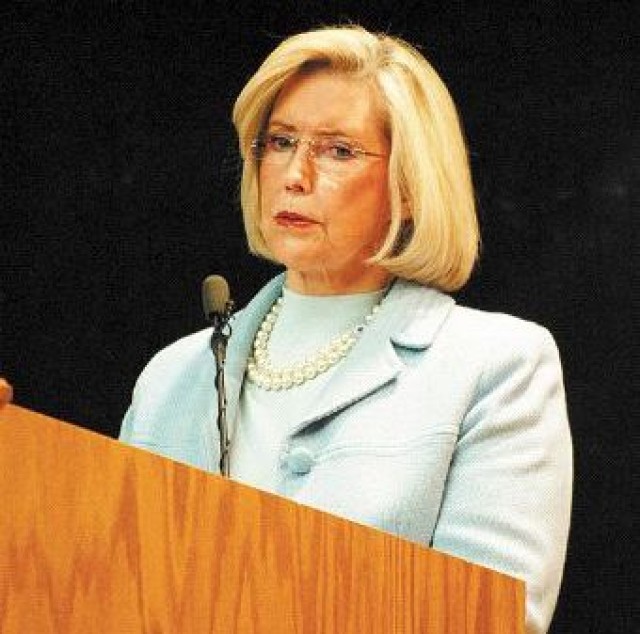On March 15, civilians and service members alike came together on Joint Base Myer-Henderson Hall to celebrate Women's History Month at Henderson Hall's Joe Rosenthal Theater.
''It's all about making sure our daughters are able to achieve their potential and what they are capable of achieving," said JBM-HH Commander Col. Carl R. Coffman.
Members of the Joint Base Myer-Henderson Hall Equal Opportunity Office in collaboration with members of The Old Guard, Chief of Naval Operations and Rader Clinic brought in Lilly Ledbetter as the guest speaker for the event that memorialized famous women in history.
On Jan. 29, 2009, ''The Lilly Ledbetter Fair Pay Act" was the first law that President Obama signed after taking office.
''I never started out in life to be a spokesperson for people's rights," Ledbetter said.
''I had a very simple plan. I was going to live the American dream, get a good education, find the right man, settle down and get a good job," she said.
Ledbetter worked for a leading tire company for 19 years. She was hired in 1979.
''I felt like I was a trailblazer because so few women had that job in the past and none of them had ever lasted any length of time," she said.
She filed two law suits in 1998, one for sexual harassment in July and one for pay discrimination in November, after receiving an anonymous tip showing her salary was at least 40 percent lower than the men in the same position.
With the support of her husband she decided to go to the Birmingham, Ala., Equal Employment Opportunity Commission to file a complaint. Overworked and understaffed, the agency said she might want to get her own attorney.
Although she paid $35,000 in legal fees, her attorney listened to her case and his firm took her case ''pro bono," which means they would only earn a portion of what she won in court. She has never received anything for the injustice brought upon her, yet the law firm still stands behind her and supports her after all these years. Ledbetter was able to have two women who held the same job as she did testify in court on her behalf. One of the women said she didn't complain because she was a divorced mother who supported a blind, handicapped son and couldn't afford to miss a paycheck.
When Ledbetter's case was presented to a jury they ruled in favor of her saying she deserved $3.8 million in a settlement.
But the judge countered with what the law states: When a case is based on gender alone the defendant cannot receive more than $300,000. That's what she won, along with two years back pay equaling $60,000.
On appeal, her case then went on to be presented in front of the Supreme Court in November 2006. The verdict was released May 2007. She lost.
Their concern was if they let her win, others would step forward with suits as well, said Ledbetter.
Since then she has spoken to people around the nation telling her story. Though the bill passed in her name does not help her situation, it can help others, she said.
''I'm not here to talk politics. It's not political, it's civil rights. It's an equal rights matter. Not a man in this room would say 'Yes, I want my mother, wife, daughter or daughter-in-law short changed,'" said Ledbetter.
''We need our country to get back on track and we can do it by getting our Families treated fairly and equally."
Ledbetter's message spoke to men and women alike.
''It was motivating. I know a lot of people give up on causes because they run into brick walls. To show, hey, you can persevere; maybe you'll accomplish this goal," said 1st Sgt. Bruce Williams, Headquarters and Headquarters Company, United States Army Garrison.
''What will stand out in my mind is the support she had from her husband. She wasn't alone."
''Just having that Family support really helps, and that's what a lot of military Families need today with deployments and so forth," said Williams.
''We need support while we're there, and we need support while we're back here, at home."
Before Ledbetter gave her speech, Holly Bass, a spoken word artist, performed four pieces for the audience.
An excerpt from her ''Hard Work" goes: ''His mother, my grandmother, was a field hand and later a domestic. She worked very hard. In 1971, she bought herself a brick house with her earnings and then kept her old house - a wooden, shot-gun one-story- as a rental property. Not bad for a cleaning lady."
Along with that poem, she also performed ''Lineage," ''What's Left" and ''Tenderness," before the deputy JBM-HH chaplain closed the event.
''Thank you for all the cherished women in our lives: mothers, sisters, friends and neighbors; generations of women who have shaped our history," said Chap. (Maj.) David Santiago Cruz, JBM-HH deputy chaplain.


Social Sharing